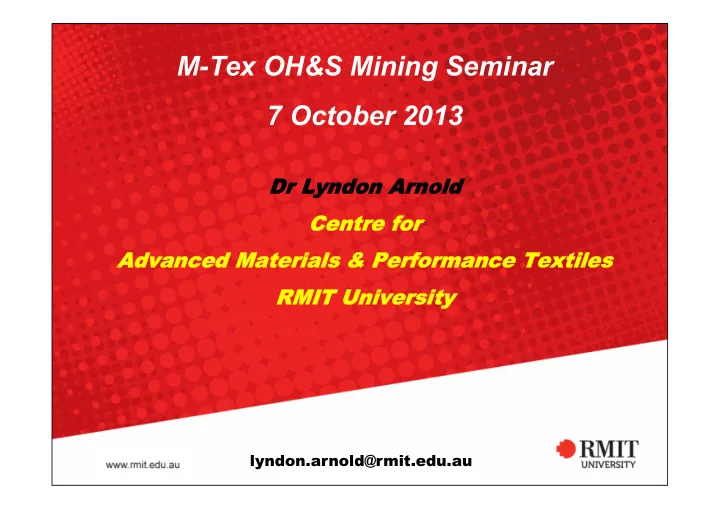

M-Tex OH&S Mining Seminar 7 October 2013 Dr Lyndon Arnold Centre for Advanced Materials & Performance Textiles RMIT University lyndon.arnold@rmit.edu.au
Centre for Advanced Materials & Performance Textiles - Core Research Activities- Any textiles but especially relating to : Protection/Performance/Comfort Protective textiles Geotextiles Medical textiles Sports textiles Footwear
RMIT SFT investigates personal protection issues: Fire-fighter outerwear: Can you see it? Is it strong enough? Does it degrade in UV? Does flame-resistance last? What are replacement criteria? Consider boots & gloves: Do they really protect for this work? Impact & penetration protection? Are they comfortable (all day)? Abrasion performance? Are they waterproof? Are they fireproof?
Short-to-long term OH&S Work Protection against: • Dust & smoke • Heat, flame & burning • Impact or compressive injury • Abrasion • Cut & penetration • Poor visibility • Chemical & gases • Bacteria & pathogens • Electrocution • Radiation IT IS SENSIBLE TO IDENTIFY & MITIGATE THESE BEFORE INJURY OCCURS
BUT protection extends beyond personnel: – Plant & production – Product & resources – Environment For above ground & open-cut mining problems = – Sun – Wind – Water – Pollution For underground problems = – Roof support – Gases & ventilation – Dust – Pollution IT IS SENSIBLE TO IDENTIFY THESE BECAUSE THEY CAN COST BIG MONEY
Underground protection? By what, for what? Mine workers Brattice work Ventilation Mine machinery Conveyors Roof support Underground work wear & safety gear? Dust is dangerous! Boots Masks? Helmets Filtration? Strong clothing
Above ground protection? By what, for what? Mine machinery Surface work wear & Conveyors safety gear? Trucks Visibility Roadways & dams Boots Overburden & product Helmets Strong clothing Sun & rain protection Dust is still dangerous! Masks & filtration? What about rain & mud? Slippery soles? Waterproofing?
What is important about apparel? Functionality – fit-for-use – can you still do the job? Performance – real protection against perceived hazards Comfort – if not comfortable, apparel will not be worn What is important about non-apparel? Off-beat applications – may be applied to new problems New materials – new uses = new solutions New solutions – potential savings
If you are a miner – Underground or Open Cut – Identify your textile problems - Tell us about them. The Centre for Advanced Materials & Performance Textiles RMIT University Can very likely help ! lyndon.arnold@rmit.edu.au
Recommend
More recommend